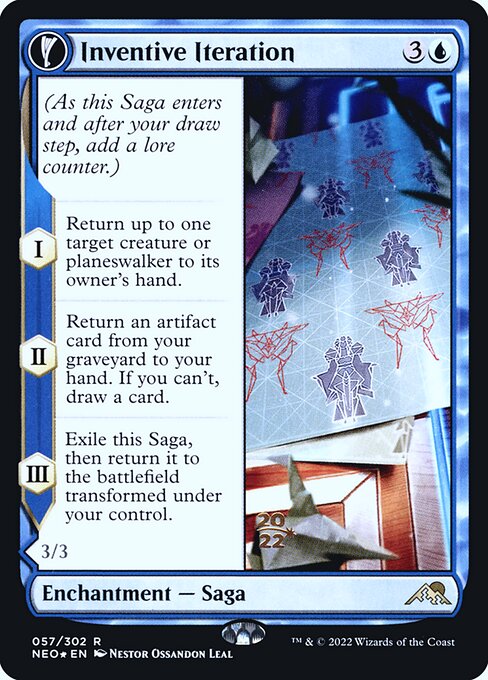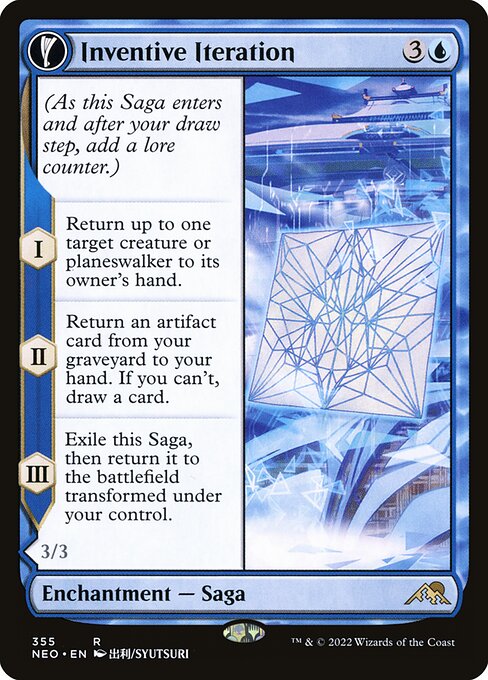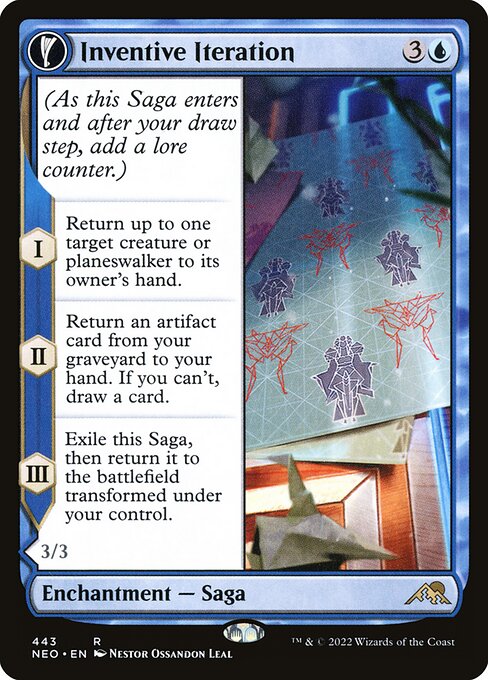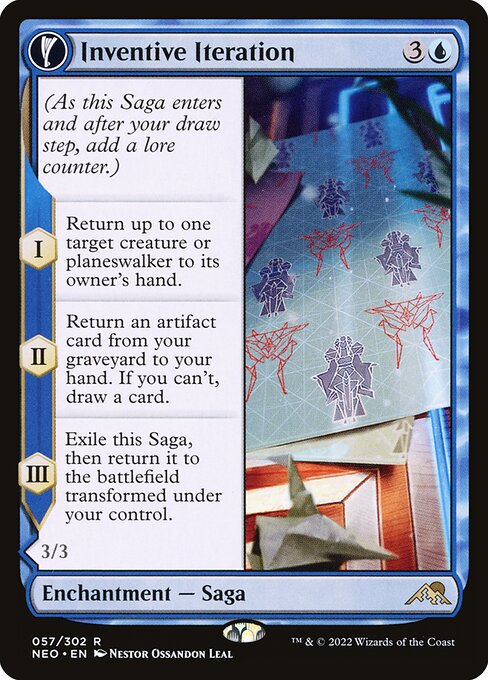Inventive Iteration // Living Breakthrough
//
Enchantment — Saga // Enchantment Creature — Moonfolk
(As this Saga enters and after your draw step, add a lore counter.)
I — Return up to one target creature or planeswalker to its owner's hand.
II — Return an artifact card from your graveyard to your hand. If you can't, draw a card.
III — Exile this Saga, then return it to the battlefield transformed under your control. // Flying
Whenever you cast a spell, your opponents can't cast spells with the same mana value as that spell until your next turn.
I — Return up to one target creature or planeswalker to its owner's hand.
II — Return an artifact card from your graveyard to your hand. If you can't, draw a card.
III — Exile this Saga, then return it to the battlefield transformed under your control. // Flying
Whenever you cast a spell, your opponents can't cast spells with the same mana value as that spell until your next turn.
3/3
standard
future
historic
gladiator
pioneer
explorer
modern
legacy
pauper
vintage
penny
commander
brawl
alchemy
paupercommander
duel
oldschool
premodern
Rulings
Living Breakthrough's triggered ability won't affect spells that a player has already cast, even if those spells haven't resolved yet.
If you are instructed to put a card that isn't a double-faced card onto the battlefield transformed, it will not enter the battlefield at all. In that case, it stays in the zone it was previously in. For example, if a single-faced card is a copy of Azusa's Many Journeys, the chapter III ability will cause it to be exiled and then remain in exile.
Each transforming double-faced card in this set is cast face up. In every zone other than the battlefield, consider only the characteristics of its front face. If it is on the battlefield, consider only the characteristics of the face that's up; the other face's characteristics are ignored.
A transforming double-faced card enters the battlefield with its front face up by default, unless a spell or ability instructs you to put it onto the battlefield transformed or you cast it transformed, in which case it enters with its back face up.
The back face of a transforming double-faced card usually has a color indicator that defines its color.
Each face of a transforming double-faced card has its own set of characteristics: name, types, subtypes, abilities, and so on. While a transforming double-faced permanent is on the battlefield, consider only the characteristics of the face that's currently up. The other set of characteristics is ignored.
Living Breakthrough's triggered ability will resolve before the spell that caused it to trigger. Notably, the ability has no effect until it resolves, so your opponents can respond to it by casting instant spells with the same mana value as the original spell.
The mana value of a transforming double-faced card is the mana value of its front face, no matter which face is up.
If you are instructed to put a card that isn't a double-faced card onto the battlefield transformed, it will not enter the battlefield at all. In that case, it stays in the zone it was previously in. For example, if a single-faced card is a copy of Azusa's Many Journeys, the chapter III ability will cause it to be exiled and then remain in exile.
Each transforming double-faced card in this set is cast face up. In every zone other than the battlefield, consider only the characteristics of its front face. If it is on the battlefield, consider only the characteristics of the face that's up; the other face's characteristics are ignored.
A transforming double-faced card enters the battlefield with its front face up by default, unless a spell or ability instructs you to put it onto the battlefield transformed or you cast it transformed, in which case it enters with its back face up.
The back face of a transforming double-faced card usually has a color indicator that defines its color.
Each face of a transforming double-faced card has its own set of characteristics: name, types, subtypes, abilities, and so on. While a transforming double-faced permanent is on the battlefield, consider only the characteristics of the face that's currently up. The other set of characteristics is ignored.
Living Breakthrough's triggered ability will resolve before the spell that caused it to trigger. Notably, the ability has no effect until it resolves, so your opponents can respond to it by casting instant spells with the same mana value as the original spell.
The mana value of a transforming double-faced card is the mana value of its front face, no matter which face is up.
Rulings
Living Breakthrough's triggered ability won't affect spells that a player has already cast, even if those spells haven't resolved yet.
If you are instructed to put a card that isn't a double-faced card onto the battlefield transformed, it will not enter the battlefield at all. In that case, it stays in the zone it was previously in. For example, if a single-faced card is a copy of Azusa's Many Journeys, the chapter III ability will cause it to be exiled and then remain in exile.
Each transforming double-faced card in this set is cast face up. In every zone other than the battlefield, consider only the characteristics of its front face. If it is on the battlefield, consider only the characteristics of the face that's up; the other face's characteristics are ignored.
A transforming double-faced card enters the battlefield with its front face up by default, unless a spell or ability instructs you to put it onto the battlefield transformed or you cast it transformed, in which case it enters with its back face up.
The back face of a transforming double-faced card usually has a color indicator that defines its color.
Each face of a transforming double-faced card has its own set of characteristics: name, types, subtypes, abilities, and so on. While a transforming double-faced permanent is on the battlefield, consider only the characteristics of the face that's currently up. The other set of characteristics is ignored.
Living Breakthrough's triggered ability will resolve before the spell that caused it to trigger. Notably, the ability has no effect until it resolves, so your opponents can respond to it by casting instant spells with the same mana value as the original spell.
The mana value of a transforming double-faced card is the mana value of its front face, no matter which face is up.
If you are instructed to put a card that isn't a double-faced card onto the battlefield transformed, it will not enter the battlefield at all. In that case, it stays in the zone it was previously in. For example, if a single-faced card is a copy of Azusa's Many Journeys, the chapter III ability will cause it to be exiled and then remain in exile.
Each transforming double-faced card in this set is cast face up. In every zone other than the battlefield, consider only the characteristics of its front face. If it is on the battlefield, consider only the characteristics of the face that's up; the other face's characteristics are ignored.
A transforming double-faced card enters the battlefield with its front face up by default, unless a spell or ability instructs you to put it onto the battlefield transformed or you cast it transformed, in which case it enters with its back face up.
The back face of a transforming double-faced card usually has a color indicator that defines its color.
Each face of a transforming double-faced card has its own set of characteristics: name, types, subtypes, abilities, and so on. While a transforming double-faced permanent is on the battlefield, consider only the characteristics of the face that's currently up. The other set of characteristics is ignored.
Living Breakthrough's triggered ability will resolve before the spell that caused it to trigger. Notably, the ability has no effect until it resolves, so your opponents can respond to it by casting instant spells with the same mana value as the original spell.
The mana value of a transforming double-faced card is the mana value of its front face, no matter which face is up.
Your collection? Your decks?
Want to manage your collection and/or create decks?



 0
0
 0.15€
0.15€

